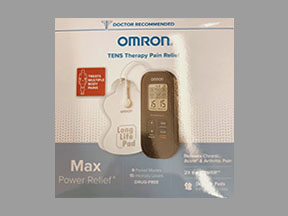
Tens Therapy Pain Relief Coupons & Savings Card – Discount Prices from $26.09
My prescription
Edit
1, Tens Therapy Pain Relief (1 Device)
Select pharmacy

Albertsons
$26.09
COUPON PRICE
Walgreens
$26.09
COUPON PRICETens Therapy Pain Relief savings card
Show this card to your pharmacist
Albertsons
$26.09
BIN
ID
PCN
GRP
011867
LHDEE38AB9
HT
LABH001
Powered by
Price history for Tens Therapy Pain Relief
1 Device, 1nan
Average retail price for Tens Therapy Pain Relief
Average SaveHealth price for Tens Therapy Pain Relief
Our price history data is based on aggregated prescription data collected from participating pharmacies in America. Our prescription data updates daily to reflect the latest price changes. If you notice a missing data point, it means there wasn't sufficient data available to generate a monetary value for that date.
*Retail prices are based on pharmacy claims data, and may not be accurate when we don't have enough claims.
Tens Therapy Pain Relief dosage forms
Dosage Quantity Price from Per unit 1nan 1 Device $27.94 $27.94
| Dosage | Quantity | Price from | Per unit |
|---|---|---|---|
| 1nan | 1 Device | $27.94 | $27.94 |
Does TENS heal or just mask pain?
Transcutaneous Electrical Nerve Stimulation (TENS) primarily works by masking pain rather than healing the underlying condition. It provides pain relief by sending electrical impulses through the skin to stimulate nerves, which can help block pain signals to the brain and promote the release of endorphins, the body's natural painkillers. However, it does not address the root cause of the pain or promote healing of the underlying issue.
Is there a downside to using a TENS unit?
Yes, there are some potential downsides to using a TENS unit. Some individuals may experience skin irritation or allergic reactions at the site where the electrodes are placed. Additionally, improper use or placement of the electrodes can lead to discomfort or muscle twitching. It is also important to note that TENS units should not be used by individuals with pacemakers, during pregnancy, or on certain areas of the body such as the head or throat without medical advice. It is always recommended to consult with a healthcare professional before starting TENS therapy to ensure it is appropriate for the individual's specific condition.
Are there any negative side effects of TENS?
Transcutaneous Electrical Nerve Stimulation (TENS) is generally considered safe, but some individuals may experience negative side effects. These can include skin irritation or redness at the site of electrode placement, muscle twitching, or discomfort from the electrical stimulation. In rare cases, individuals may experience dizziness or headaches. It is important to follow the device instructions and consult with a healthcare professional if any adverse effects occur.
When should you not use a TENS unit?
A TENS unit should not be used in certain situations. It is generally advised to avoid using a TENS unit if the individual has a pacemaker or any other implanted electronic device, as it may interfere with its function. It should not be used on areas of the body where there is a malignancy or cancerous lesion. Additionally, it should not be applied over the eyes, on the front of the neck, or on broken or irritated skin. Pregnant individuals should consult with a healthcare provider before using a TENS unit, especially on the abdominal or pelvic area. It is also important to avoid using it while driving or operating heavy machinery. Always consult with a healthcare professional before starting TENS therapy to ensure it is safe and appropriate for the individual's specific condition.
